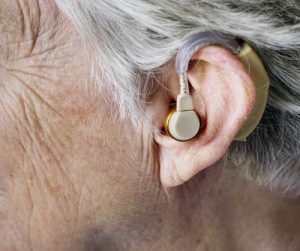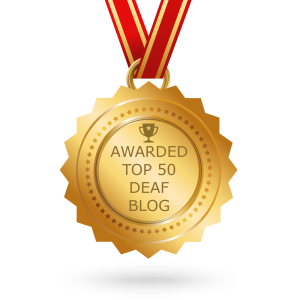For the first time in more than 130 years, the major organisation for deaf people in Victoria, Australia, will not have the word ‘deaf’ in its title. In the first of a two-part series, MICHAEL UNIACKE takes a look at what this means.
WHAT’S IN A NAME? Will Vicdeaf by any other name smell as sweet? ‘Vicdeaf’ will soon disappear, and will be replaced by ‘Expression Australia’.
Vicdeaf’s very first name, in 1883, was ‘The Victorian Society for Promoting the Spiritual and Temporal Welfare of the Adult Deaf and Dumb’. This whopper of a title reflected the concerns of the times, when hearing missioners, virtually in charge of deaf people’s lives, wanted to make sure their flock stayed off the booze and were Christians, good and true.
Over more than 100 years, the official name has shrunk. The title ‘Adult Deaf and Dumb Society of Victoria’ was a hardy stayer through most of the 20th century. For a shorter title, ‘Dumb’ was obviously the first to be turfed out. After a few years, the ‘Adult’ quit, and ran off with ‘Society’. ‘Victoria’ was sliced in half and became ‘Vic’, which moved in to live with the hardy survivor, ‘Deaf’, leaving us with ‘Vicdeaf’. This variation on ‘deaf’ is probably the second shortest name possible.

As the affairs of the world became larger and more complex in terms of social change, education and technology, the name continued to shrink. The rate of change to the name was fastest in the last quarter of the previous century, a time of upheaval and challenge for Australia’s deaf community. Like a small child holding on to a teddy bear in a world going mad, the organisation seemed to want to retreat and hold on to the one thing that stayed the same, the one thing that truly mattered: deaf. Even in its logo, the i in ‘Vicdeaf’ was intended to suggest a gas lamp, under which deaf people in the streets conversed on their fingers in the 1880s. This tribute to history aside, the greatest impact now is the excision of the word ‘deaf’.
SHOULD ORGANISATIONS that concern themselves with deafness include ‘deaf’ in their titles? Not necessarily, because ‘deaf’ means different things to different people. The obvious, and traditional, meaning is the loss of the sense of hearing. The subtle meaning is that ‘deaf’ refers to a particular way of looking at the world. It’s the traditional deaf societies around Australia, and the respective state consumer bodies of deaf people, that manage to carry shades of both, particularly the subtle meaning, and they do so by weight of the histories of the deaf men and women at the heart of these organisations. The exception is in Adelaide, South Australia, where deaf people put up with the twee and faintly offensive ‘Deaf Can Do’.
Better Hearing Australia doesn’t carry the word ‘deaf’ in its title, but it doesn’t need to. Its name carries the opposite of deafness – hearing, because that is its business. Then there are organisations like the Shepherd Centre in Sydney and Taralye in Melbourne that stay well away from ‘deaf’. That makes sense. These organisations devote themselves to speech and hearing, and regard deaf people and Auslan in much the same way that butchers regard vegetarians.
And yet, another organisation without the word ‘deaf’ in its title lies close to the heart of the international deaf community. Nowhere on the opening page of Gallaudet University’s website will you find the word ‘deaf’. This is the exception that proves the rule; Gallaudet has been intimately associated with deafness since President Abraham Lincoln signed its Charter, created by the US Congress, more than 150 years ago. In London, what used to be the Royal National Institute for the Deaf, the RNID, changed its name to Action on Hearing Loss. The change came about due to confusion with the equivalent organisation for the blind called the RNIB, and due to a move into hearing loss prevention, which on the surface, leaves behind the interests of deaf people.
Regardless of whether or not ‘deaf’ lurks in the title, changing a name is a major thing to do. Yet it is quite common. While Vicdeaf’s new name, ‘Expression Australia’, does not refer to ‘deaf’, it’s not the first time a disability organisation has gone down that road. The organisation that used to be Autism Australia became Amaze. What used to be the Spastic Society became Scope.
Even the bank we know as Westpac used to be called the Bank of New South Wales. When it changed to Westpac, a common response was that name better suited a long-haul trucking and freight company. No-one remembers that now; Westpac is known instantly as a bank. In fact, none of the four major banks – Westpac, NAB, Commonwealth, ANZ – have that word in their name.
There’s another example in Australian Rules football. The Footscray Football Club was formed in 1877 in the inner-western suburbs of Melbourne. More than 100 years later, it changed its name to the Western Bulldogs. The club needed to move with the times and reach out to a much wider geographical base than Melbourne’s inner west. There was some opposition to the name change, but it petered out. ‘Footscray Football Club’ remains as its legal name.
NONE OF THESE EXAMPLES however touch upon the emotional payload of the word ‘deaf’. That’s why Vicdeaf was careful with its consultation, claiming that over 400 people were involved in interviews and focus groups. All well and good, but it would be useful to know more about the relationship with Vicdeaf of those consulted. Those close to an organisation can fall into the groupthink syndrome, where responses are less from individuals and more from what the group thinks the organisation wants to hear. I would have been interested in a lot more responses from the hearing-impaired, especially from those with little or nothing to do with the organisation. Even more interesting would be to seek comment from hearing people who know almost nothing about deafness. There again, wide surveys with high returns and their data analysis are expensive and take time.
Vicdeaf could do a much better job in fielding comments on its Facebook page. Its robotic responses to comments from obviously distressed deaf people protesting at the loss of the word ‘deaf’ were unfortunate. Furthermore, Vicdeaf’s claim that hearing-impaired people do not like the present title strikes me as redundant. Hearing-impaired people usually react to the word ‘deaf’ in the way vampires react to a clove of garlic.

Therein lies the rub, and I don’t mean garlic. The hearing-impaired are the thundering herd of elephants in every room that hosts any discussion around deafness. I do mean a herd of elephants. In Australia, those who are hearing-impaired number in the millions, while those who use Auslan number in the mere thousands. For each deaf person who signs, there are at least 1300 hearing-impaired people who do not, and that’s being kind. It’s like looking at a tadpole, and then looking at a whale.
No organisation that concerns itself with deafness can ignore numbers like that. This is the era of the NDIS, which is turning traditional disability block funding into a consumers’ marketplace. Vicdeaf and others must now compete for clients, and on sheer weight of numbers, giving the appearance in the market of a ‘deaf’ organisation is no longer going to cut it.
IN VICDEAF’S VIDEO announcing the change, Lance Hately stands next to a display revealing the old commemorative cornerstones preserved from the buildings from the early days of the Adult Deaf and Dumb Mission. That’s standard political theatre: when you announce radical change, you do it with a sober, conservative backdrop that reflects steadfastness and where you come from. This piece of theatre reflects Vicdeaf’s anxiety to keep the peace with the deaf community, to reassure it: yes, deaf is about to go from our name, but we are still with you; we have been with you since the late 1880s.
I doubt Vicdeaf needs to worry. The deaf community has shown extraordinary resilience to the profound changes of the second half of the previous century. It held fast during the 1950s, when deaf people first appeared with hearing aids. In the 1970s it said hello to young deaf people, educated under oralism and who knew no sign language, but who were curious about this community and who wanted to learn. In the 1990s it said to more curious young deaf people, this time with cochlear implants: welcome, come on in. At any gathering of deaf people now, it is normal and unremarkable to see people with hearing aids, with cochlear implants, and whose first language is not Auslan. The deaf community flexed with and adjusted to the changes because of the one thing all had in common: the profound ease of communication. A change of name is not going to affect that.
THE CHANGE TO A NEW NAME is a bold and gutsy move. It is the right response to a profound and radical change in the disability landscape in Australia. It may even provoke an opportunity to embrace the countless numbers of isolated and disaffected hearing-impaired. There will be hiccups, and there will be protests, but Vicdeaf has time on its side to acknowledge these, to listen and to explain, artfully and with respect.
So, what’s in a name? Everything I’ve seen so far suggests that ‘Expression Australia’ will still smell as sweet.
Next time: the words and the logo

Fantastic oversight on an emotional topic. It helped me to understand why the name was changed. My only bug is that the logo was created using light gloves which was photographed in the dark. Facial expression is a vital aspect of Auslan yet there can be no expression seen in light gloved photos. The term Exoression Australia is, as a result, quite ironic. I cant wait for part 2. Cheers to you Michael. From Darren Robert’s.
I absolutely abhor the utterly
ridiculous brand name and sign bestowed on our beloved Vicdeaf’s brand name.
Vicdeaf has a marvellous history set up by our Deaf pioneers (Yes … I am very proud to be
D E A F!!! ).
B U T I am at a loss as to why the naysayers cringe at the word DEAF!!!
It not only encompasses the medical view (mainly from the hearing sector who know zilch about deafness) and the decision makers have insulted the Deaf community, their identity, culture, and unique language. By the way, Vicdeaf claims they sent out a survey about the brand name but I, amongst so many others have never seen it. The new brand name has lopped off the Deaf community which was always at the forefront and the mainstay of Vicdeaf . I can understand Vicdeaf’s need to have a brand name but for heaven’s sake, there is no way that I and so many others can accept it. It just does not make sense at all !!
I disagree with the author of this blog when he says this: “I would have been interested in a lot more responses from the hearing-impaired, especially from those with little or nothing to do with the organisation. Even more interesting would be to seek comment from hearing people who know almost nothing about deafness.”
The bottom line is the mission and goals: if a Deaf organization wants to serve signing Deaf people, it should be proud about it and go all the way with it. Asking opinions of hearing-impaired or hearing people would not help such an organization with its mission and goals.
It seems to me that Vicdeaf is such an organization…unless I’m mistaken about their focus?